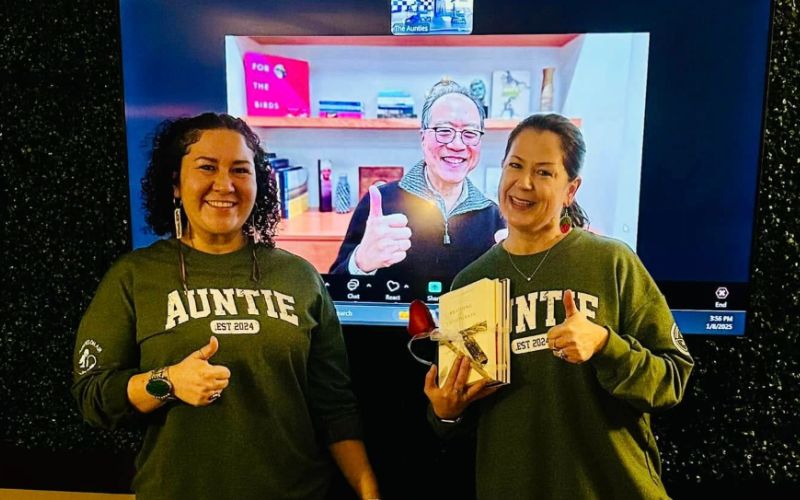
- Details
- By Native News Online Staff
On February 11, 2025, a podcast produced and hosted by Wabanaki Public Health & Wellness, Aunties on Air… and Some Uncles Too, will release a special episode featuring world-renowned cellist and songwriter Yo-Yo Ma.
The episode, titled For the Love of Music: Listening with our Hearts & Healing Through Music, explores the power of music as a universal language, its role in connection, and its ability to celebrate culture and healing. It will be released on all major podcast platforms.
Co-CEO of Wabanaki Public Health and Wellness Lisa Sockabasin (Passamaquoddy Tribe at Motahkomikuk) and Lauren Stevens (Passamaquoddy Tribe at Motahkomikuk) hosted the episode and led the discussion with Ma, diving into how music transcends cultural boundaries and creates a sense of unity and belonging.
Ma, an award-winning musician and cultural advocate, has long used his platform to highlight the importance of connection through music. With 18 Grammy Awards and a career that spans decades, he is widely recognized not only for his artistry but for his dedication to fostering cultural exchange and supporting Indigenous peoples through organizations like Nia Tero and the Silkroad collective.
Aunties on Air… and Some Uncles Too launched in July 2024 to amplify Wabanaki voices. The podcast has become a platform for Indigenous voices, tackling the erasure and marginalization that Native communities have faced for generations. Through humor, heartfelt dialogue, and sometimes tears, it offers what the hosts call “good medicine.”
The upcoming episode, part of the For the Love of… series, promises to be a highlight for both long-time listeners and newcomers. In addition to its focus on music, the series will explore other themes tied to love and connection.
The episode with Yo-Yo Ma will be available on February 11, 2025, on all major podcast platforms. Listeners can look forward to an intimate and heartfelt conversation that showcases the intersection of music, culture, and healing.
More Stories Like This
New Book Showcases 250 Images by Indigenous Photographers Spanning Two CenturiesFive Native American Chefs You Should Know
Short Film Documents First Full Kayak Run of the Klamath After Dam Removals
Joy Harjo Honored With Portrait of a Nation Award at Smithsonian Gala
Creative Continuities: Family, Pride, and Community in Native Art Opens Today at the Autry Museum in LA
Help us tell the stories that could save Native languages and food traditions
At a critical moment for Indian Country, Native News Online is embarking on our most ambitious reporting project yet: "Cultivating Culture," a three-year investigation into two forces shaping Native community survival—food sovereignty and language revitalization.
The devastating impact of COVID-19 accelerated the loss of Native elders and with them, irreplaceable cultural knowledge. Yet across tribal communities, innovative leaders are fighting back, reclaiming traditional food systems and breathing new life into Native languages. These aren't just cultural preservation efforts—they're powerful pathways to community health, healing, and resilience.
Our dedicated reporting team will spend three years documenting these stories through on-the-ground reporting in 18 tribal communities, producing over 200 in-depth stories, 18 podcast episodes, and multimedia content that amplifies Indigenous voices. We'll show policymakers, funders, and allies how cultural restoration directly impacts physical and mental wellness while celebrating successful models of sovereignty and self-determination.
This isn't corporate media parachuting into Indian Country for a quick story. This is sustained, relationship-based journalism by Native reporters who understand these communities. It's "Warrior Journalism"—fearless reporting that serves the 5.5 million readers who depend on us for news that mainstream media often ignores.
We need your help right now. While we've secured partial funding, we're still $450,000 short of our three-year budget. Our immediate goal is $25,000 this month to keep this critical work moving forward—funding reporter salaries, travel to remote communities, photography, and the deep reporting these stories deserve.
Every dollar directly supports Indigenous journalists telling Indigenous stories. Whether it's $5 or $50, your contribution ensures these vital narratives of resilience, innovation, and hope don't disappear into silence.
 The stakes couldn't be higher. Native languages are being lost at an alarming rate. Food insecurity plagues many tribal communities. But solutions are emerging, and these stories need to be told.
The stakes couldn't be higher. Native languages are being lost at an alarming rate. Food insecurity plagues many tribal communities. But solutions are emerging, and these stories need to be told.
Support independent Native journalism. Fund the stories that matter.
Levi Rickert (Potawatomi), Editor & Publisher

